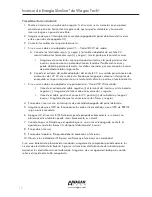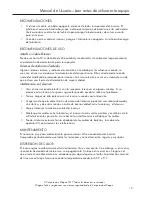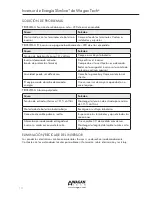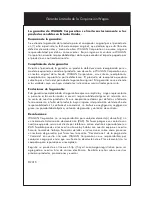
©2017 Wagan Corporation. All Rights Reserved.
Wagan Tech and
wagan.com
are trademarks of Wagan Corporation.
User’s Manual—Read before using this equipment
6
PRODUCT USAGE
Maximum Power from Vehicle Accessory Sockets
Most vehicle accessory sockets that are controlled through a vehicle’s ignition switch are fused at
15 amps. This limits inverter output to approximately 180 watts.
To Power 250 Watt Appliances: For temporary use, connect a battery clip adapter cord to the
inverter and follow the procedure located under the “Connecting the Inverter” section.
There is no danger in leaving the inverter directly wired to the battery if the inverter is turned off
after each use. The inverter will shut off when the vehicle’s battery level drops down to 9.5 volts
to protect the battery from draining completely.
Determining Maximum Appliance Wattage
s
Do not exceed the 250 watt maximum AC load or the inverter will shut down�
Most electrical tools, appliances, and audio/video equipment have labels that list the unit’s
power requirements in watts. If the tool or device is rated in amps, multiply the amps by 120
(120V AC) to determine the watts. For example, an appliance rated at 0.5 amps will draw 60
watts.
WATTS = VOLTS × AMPS
Remember to consider the startup surge that motorized appliances will cause. Do not exceed the
500 watt momentary surge rating of this inverter. This can cause immediate overload shut down
and or blow a fuse.
BASIC OPERATION
• Turn ON the power switch that is located at the front of the inverter, and the green LED
indicator will light up as an indicator that the unit is working.
• Plug your appliance(s) into the AC socket(s) at the front of the inverter.
INSTALLATION
Connecting the Inverter
Loose DC (battery) connections will result in a severe voltage drop that can cause damage to
connectors, conductors, and insulation and can cause sparking. Reverse polarity connection can
permanently damage the inverter. Damage caused by reverse polarity will void the warranty.
s
CAUTION: Making an initial connection between the positive cable end and the inverter’s
positive terminal may cause a spark� This is normal and is a result of capacitors in the
inverter starting to charge� Because of the possibility of sparking, it is extremely important
that both the inverter and the battery bank be positioned away from any source of
flammable fumes or gases� Failure to heed this warning can result in fire or explosion�
Do not make the positive terminal connection immediately after the batteries have been
charging� Allow time for the battery gasses to vent to outside air�
Installation Procedure
1. Mount the inverter in a secure location. If the inverter is to be mounted on a wall, mount it
horizontally. Make sure that the front and rear of the inverter has free air flow.
2. Make sure the ON/OFF switch located on the front panel of the inverter is in the OFF (O)
position.








































